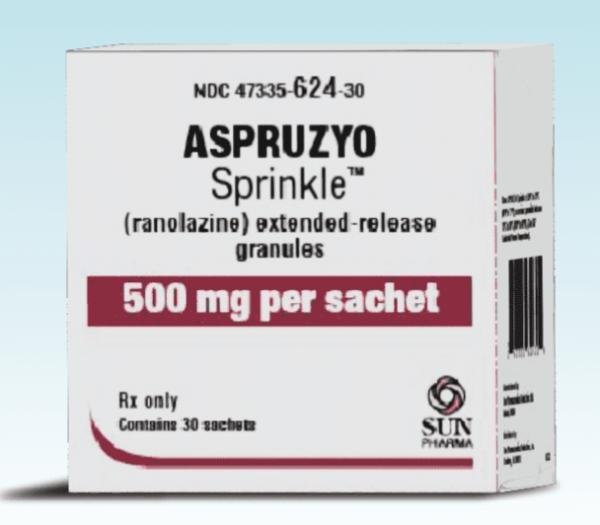Aspruzyo Sprinkle Disease Interactions
There are 3 disease interactions with Aspruzyo Sprinkle (ranolazine).
Ranolazine (applies to Aspruzyo Sprinkle) severe hepatic impairment
Major Potential Hazard, Moderate plausibility. Applicable conditions: Liver Disease
Plasma concentrations of ranolazine increased by 30% in patients with mild (Child-Pugh Class A), and by 60% in patients with moderate (Child-Pugh B) hepatic impairment. The use of ranolazine is contraindicated in patients with clinically significant hepatic impairment.
Ranolazine (applies to Aspruzyo Sprinkle) QT prolongation
Moderate Potential Hazard, Moderate plausibility. Applicable conditions: Long QT Syndrome
Ranolazine prolongs the QT interval in a dose-related manner. Caution should be exercised if used in patients with long QT interval, or using other QT- prolonging drugs.
Ranolazine (applies to Aspruzyo Sprinkle) renal disease
Moderate Potential Hazard, Moderate plausibility. Applicable conditions: Renal Dysfunction
In patients with varying degrees of renal impairment, ranolazine plasma levels increased up to 50%, Caution is advised when used in patients with renal impairment. The pharmacokinetics of ranolazine has not been assessed in patients on dialysis.
Switch to professional interaction data
Aspruzyo Sprinkle drug interactions
There are 555 drug interactions with Aspruzyo Sprinkle (ranolazine).
Aspruzyo Sprinkle alcohol/food interactions
There is 1 alcohol/food interaction with Aspruzyo Sprinkle (ranolazine).
More about Aspruzyo Sprinkle (ranolazine)
- Aspruzyo Sprinkle consumer information
- Check interactions
- Compare alternatives
- Pricing & coupons
- Drug images
- Side effects
- Dosage information
- During pregnancy
- Drug class: antianginal agents
- En español
Related treatment guides
Drug Interaction Classification
| Highly clinically significant. Avoid combinations; the risk of the interaction outweighs the benefit. | |
| Moderately clinically significant. Usually avoid combinations; use it only under special circumstances. | |
| Minimally clinically significant. Minimize risk; assess risk and consider an alternative drug, take steps to circumvent the interaction risk and/or institute a monitoring plan. | |
| No interaction information available. |
See also:
Further information
Always consult your healthcare provider to ensure the information displayed on this page applies to your personal circumstances.


